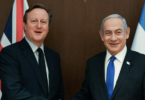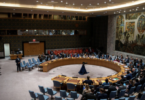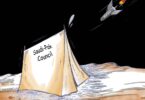Monitoring Desk
DUBAI: There’s something about the works of French-Algerian artist Zoulikha Bouabdellah that is perfect for the current times, whether it’s their lived-in feel, the domestic setting or the tangible sense of time passing in isolation. It’s hard to believe that they were conceived long before the COVID-19 pandemic occurred.
The 42-year-old, whose art explores identity, gender, otherness and spatial awareness, went into voluntary self-isolation in Morocco a long time before the imposition of strict social-distancing measures in the UAE and neighboring GCC countries. “I was nowhere near imagining the stakes of a total shutdown,” she told Arab News. “To me, it’s not just a question of physicality —it’s an ontological one: Who are we and where are we going with this?”
Bouabdellah’s mother, Malika Dorbani-Bouabdellah, was a director and her father a filmmaker and writer. These two formative figures in her life left indelible marks and shaped her visual vocabulary. “My world is of a woman expressing herself through her dual roles as an active agent and a passive observer,” said Bouabdellah whose art is a tireless pursuit of freedom from the constraints of public and private life as a woman. There is a strong sense of the feminine in her work, even though it often lacks the physical presence of a female.
Her large-scale installation series from 2012, “Doors to Heaven,” for example, features eight wooden doors, overlaid with billowing bead curtains, that are seemingly sealed and have no doorbells, handles or knobs. This one-way entry signals a point of no return and decisiveness that is at once refreshing yet cold. There are eight pairs of stilettos too, one pair placed before each door.
“The doors represent the many paths possible to reach paradise,” said Bouabdellah. “The heels, however, interest me a lot. Are they a feminist or a sexist symbol? Do they empower or oppress?”
It makes sense, then, that the shoes were left outside the doors and excluded from her idea of paradise. The woman on the other side has relinquished them. “Beyond the religious definition, to me, paradise is a promised space where evil has no way in and where one is surrounded only by beauty and matters of the soul,” she continued.
Bouabdellah’s fascination with the virtues and vices of confinement do not, ironically, exist in a vacuum. To her, it is a phenomenon that can occur intellectually and is prompted by the socioeconomic and geopolitical condition of the world today. After witnessing the rise of Islamophobia in France, epitomized by the ban of the burqa and the cordoning off of Muslims in the banlieue, she produced a photographic triptych in 2007 entitled “Ni, ni, ni.” In it, a woman uses a colander — an essential utensil in the making of the Maghrebi dish couscous — to imitate the three wise monkeys.
“I would say ignorance is probably the worst of human capacities,” she said. By placing a woman in the traditional space of a kitchen, she does not confine her to any conventional gender role, but goes beyond the body to pose a broader philosophical question: If we cannot hear and cannot communicate with the other, can we at least peer through the holes of the system, as embodied by that of the colander, and observe the other?
2008’s “Silence,” introduces another elusive female character. This time, she is daring, walking the thin line between submission and subversion. On each of 30 prayer mats, a pair of stilettos is placed inside a circular cut. The character is submerging herself within religious discourse but respecting the boundaries. “This is my way of questioning the status of women and how they are perceived both in Europe and in the Arab world,” Bouabdellah said.
Oscillating between femme fatale and damsel in distress, the female presence apparent in Bouabdellah’s work is not necessarily asking to be saved, the artist stressed. The real necessity at the moment, she believes, is to take time “to see how we arrived at a global pandemic and how we can change.”
“Are we going to plunge back into our old habits?” she asked. “I have a vague idea, and it’s not very optimistic.”
Courtesy: (Arabnews)






